4.1. Singleton
To ensure a class has a single instance
Database connection pool
HTTP Gateway
Settings
Main game/program window
The Singleton design pattern is a creational design pattern that ensures a class has only one instance, and provides a global point of access to it.
4.1.1. Recap
>>> class User:
... pass
>>>
>>>
>>> alice = User()
>>> bob = User()
>>>
>>> alice.firstname = 'Alice'
>>> alice.lastname = 'Apricot'
>>>
>>> vars(alice)
{'firstname': 'Alice', 'lastname': 'Apricot'}
>>>
>>> vars(bob)
{}
Why?
>>> alice is bob
False
>>>
>>> hex(id(alice))
'0x1072006e0'
>>>
>>> hex(id(bob))
'0x107284550'
4.1.2. Problem
I want to have only one place to store configuration
So that if I change something, this will be visible everywhere
If there are multiple instances, each instance has it's own state
>>> class Config:
... host = 'localhost'
... port = 5432
... username = 'alice'
... password = 'secret'
>>>
>>>
>>> conf1 = Config()
>>> conf2 = Config()
>>>
>>> conf1.host = 'otherhost'
>>>
>>> conf1.host
'otherhost'
>>>
>>> conf2.host
'localhost'
Why?
>>> conf1 is conf2
False
>>>
>>>
>>> conf1
<__main__.Config object at 0x1076d57f0>
>>>
>>> conf2
<__main__.Config object at 0x1076f2710>
4.1.3. Solution
>>> class Singleton:
... _instance = None
...
... def __new__(cls, *args, **kwargs):
... if cls._instance is None:
... cls._instance = super().__new__(cls)
... cls._instance.__init__(*args, **kwargs)
... return cls._instance
>>>
>>>
>>> class Config(Singleton):
... host = 'localhost'
... port = 5432
... username = 'alice'
... password = 'secret'
>>>
>>>
>>> conf1 = Config()
>>> conf2 = Config()
>>>
>>> conf1.host = 'otherhost'
>>>
>>> conf1.host
'otherhost'
>>>
>>> conf2.host
'otherhost'
>>> conf1
<__main__.Config object at 0x1076d56a0>
>>>
>>> conf2
<__main__.Config object at 0x1076d56a0>
4.1.4. Solution: @classmethod
>>> class Singleton:
... _instance = None
...
... @classmethod
... def get_instance(cls):
... if cls._instance is None:
... cls._instance = super().__new__(cls)
... return cls._instance
4.1.5. Solution: __new__
>>> class Singleton:
... _instance = None
...
... def __new__(cls, *args, **kwargs):
... if cls._instance is None:
... cls._instance = super().__new__(cls)
... cls._instance.__init__(*args, **kwargs)
... return cls._instance
4.1.6. Solution: Metaclass
>>> class Singleton(type):
... _instance = None
...
... def __call__(cls, *args, **kwargs):
... if cls._instance is None:
... cls._instance = object.__new__(cls)
... cls._instance.__init__(*args, **kwargs)
... return cls._instance
4.1.7. Case Study
Problem:
>>> from typing import Any
>>>
>>>
>>> class ConfigManager:
... settings: dict[str, Any]
...
... def __init__(self) -> None:
... self.settings = {}
...
... def set(self, key: str, value: Any) -> None:
... self.settings[key] = value
...
... def get(self, key: str) -> Any:
... return self.settings.pop(key)
>>>
>>>
>>> manager = ConfigManager()
>>> manager.set('name', 'Mark')
>>>
>>> other = ConfigManager()
>>> print(other.get('name'))
Traceback (most recent call last):
KeyError: 'name'
Solution:
>>> from typing import Any
>>>
>>>
>>> class ConfigManager:
... settings: dict[str, Any]
... instance: ConfigManager | None = None
...
... def __init__(self) -> None:
... self.settings = {}
...
... @classmethod
... def get_instance(cls) -> 'ConfigManager':
... if not cls.instance:
... cls.instance = super().__new__(cls)
... cls.instance.__init__()
... return cls.instance
...
... def set(self, key: str, value: Any) -> None:
... self.settings[key] = value
...
... def get(self, key: str) -> Any:
... return self.settings.pop(key)
>>>
>>>
>>> manager = ConfigManager.get_instance()
>>> manager.set('name', 'Mark')
>>>
>>> other = ConfigManager.get_instance()
>>> print(other.get('name'))
Mark
Diagram:
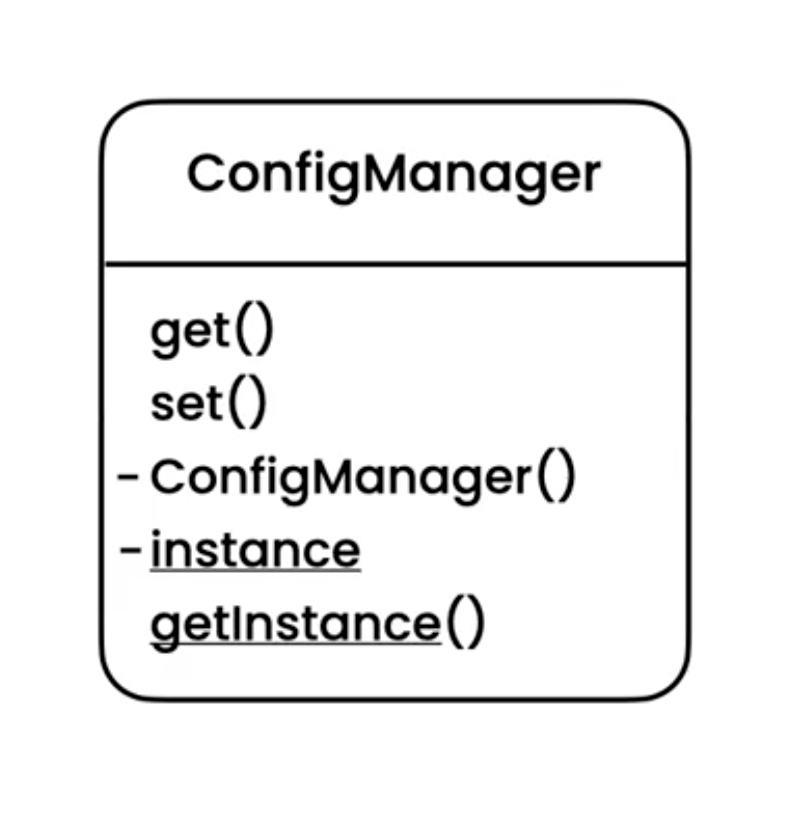
4.1.8. Use Case - 1
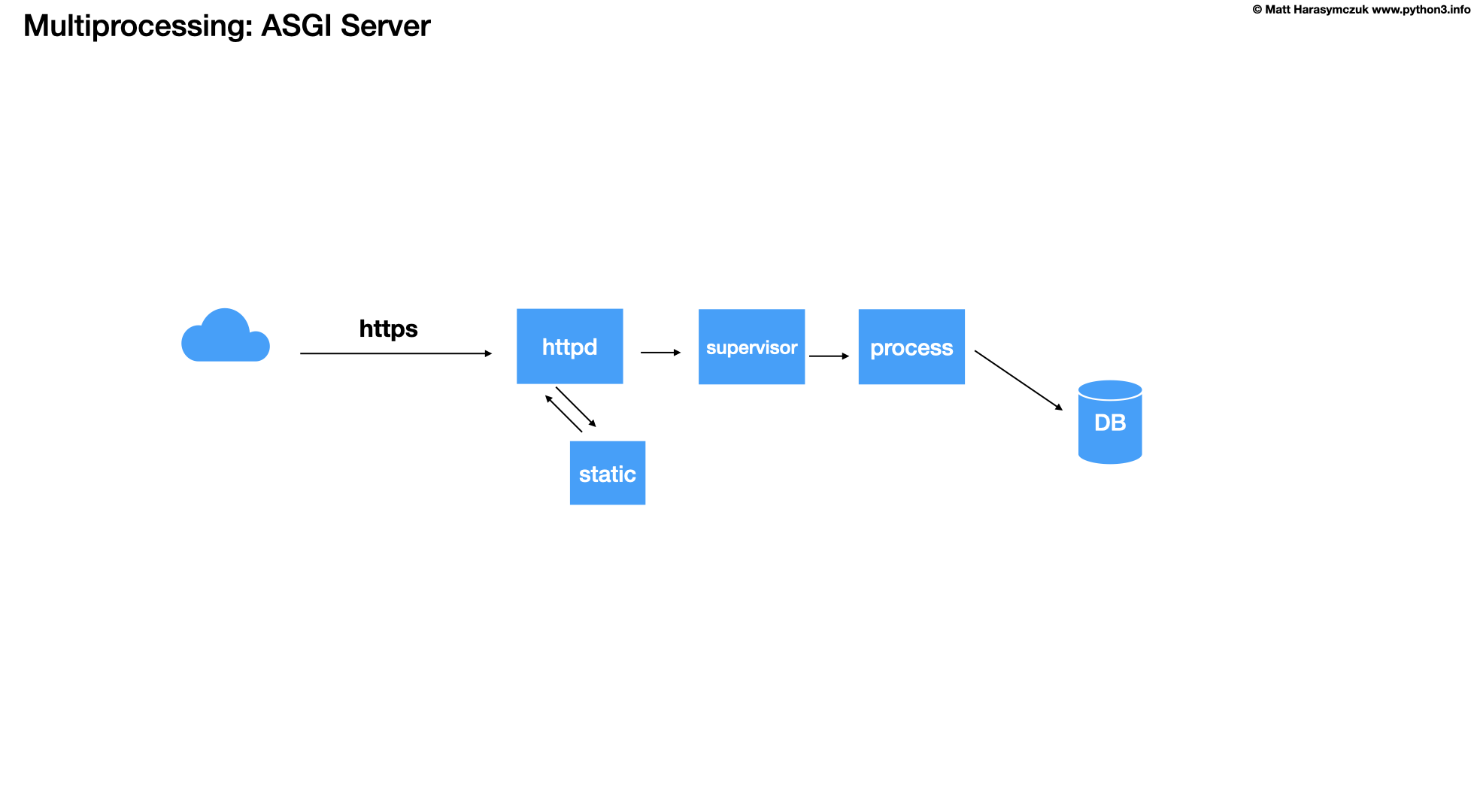
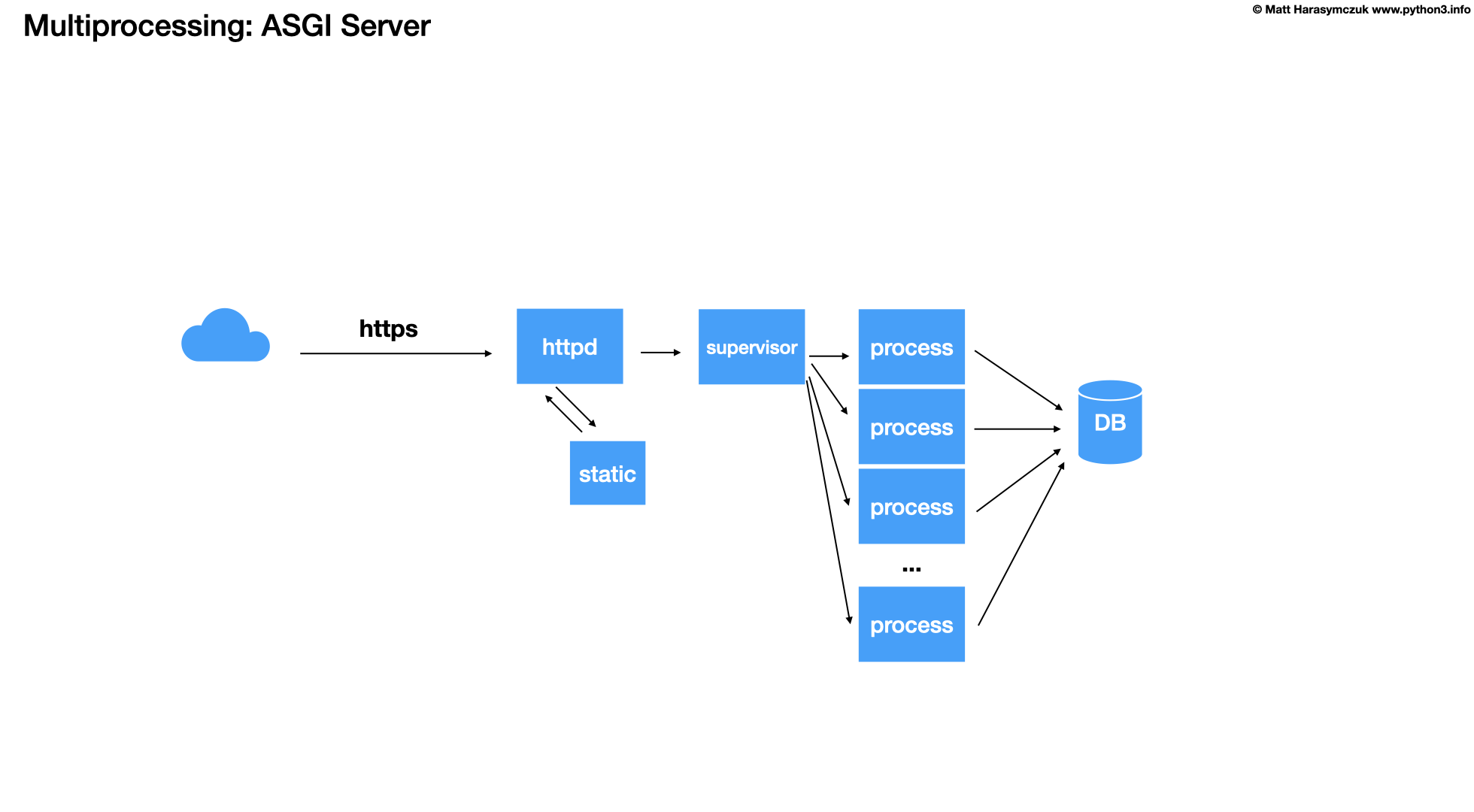
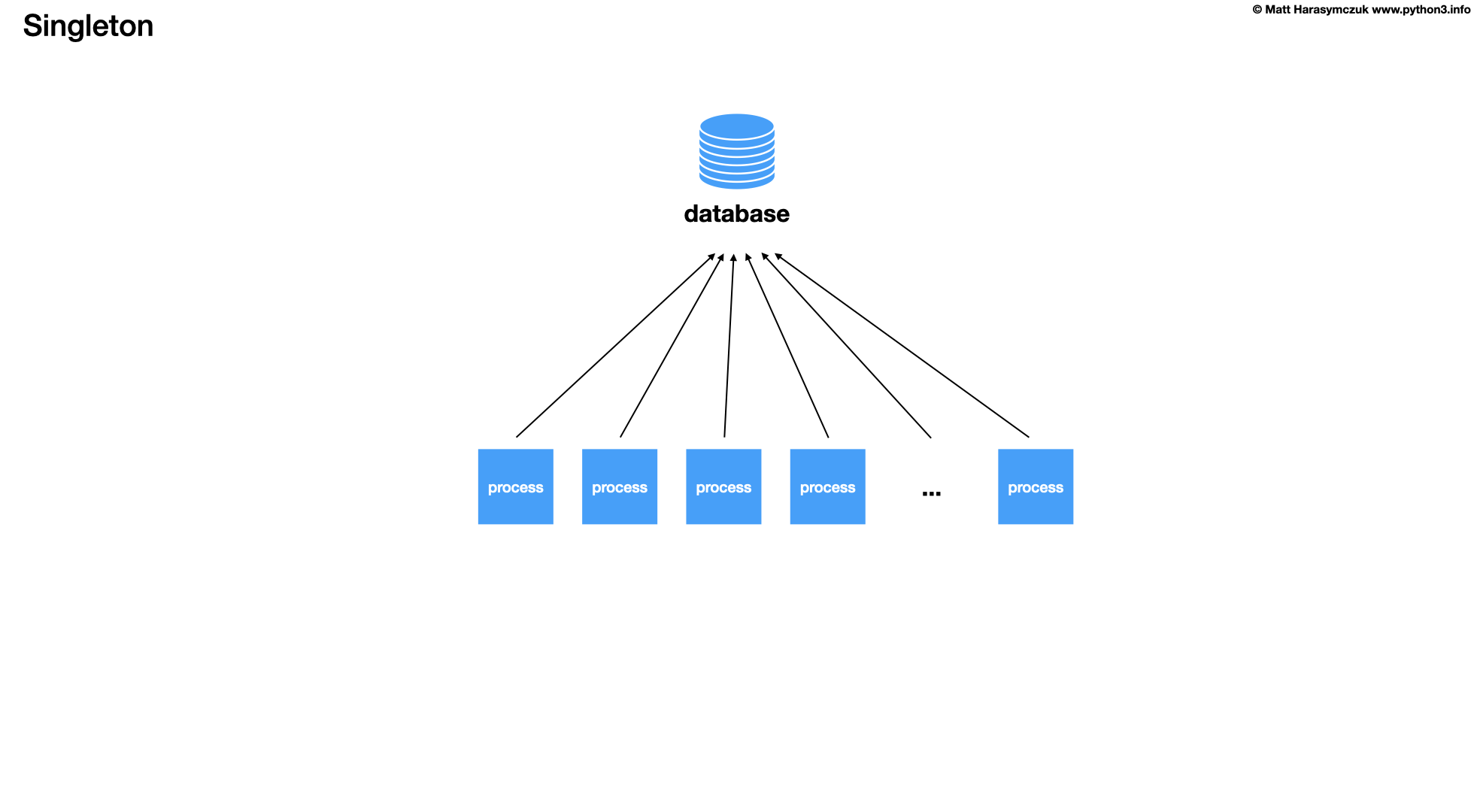
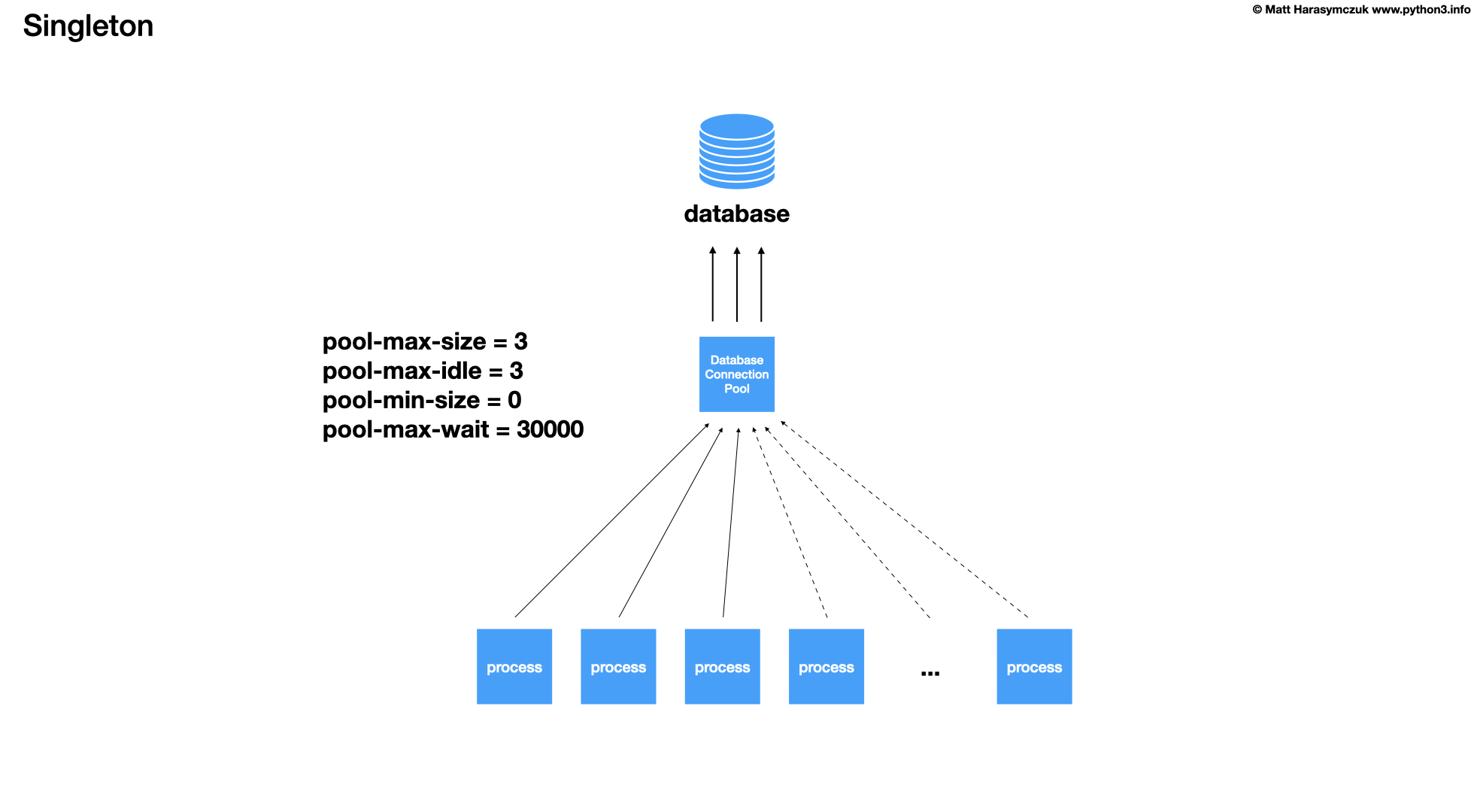
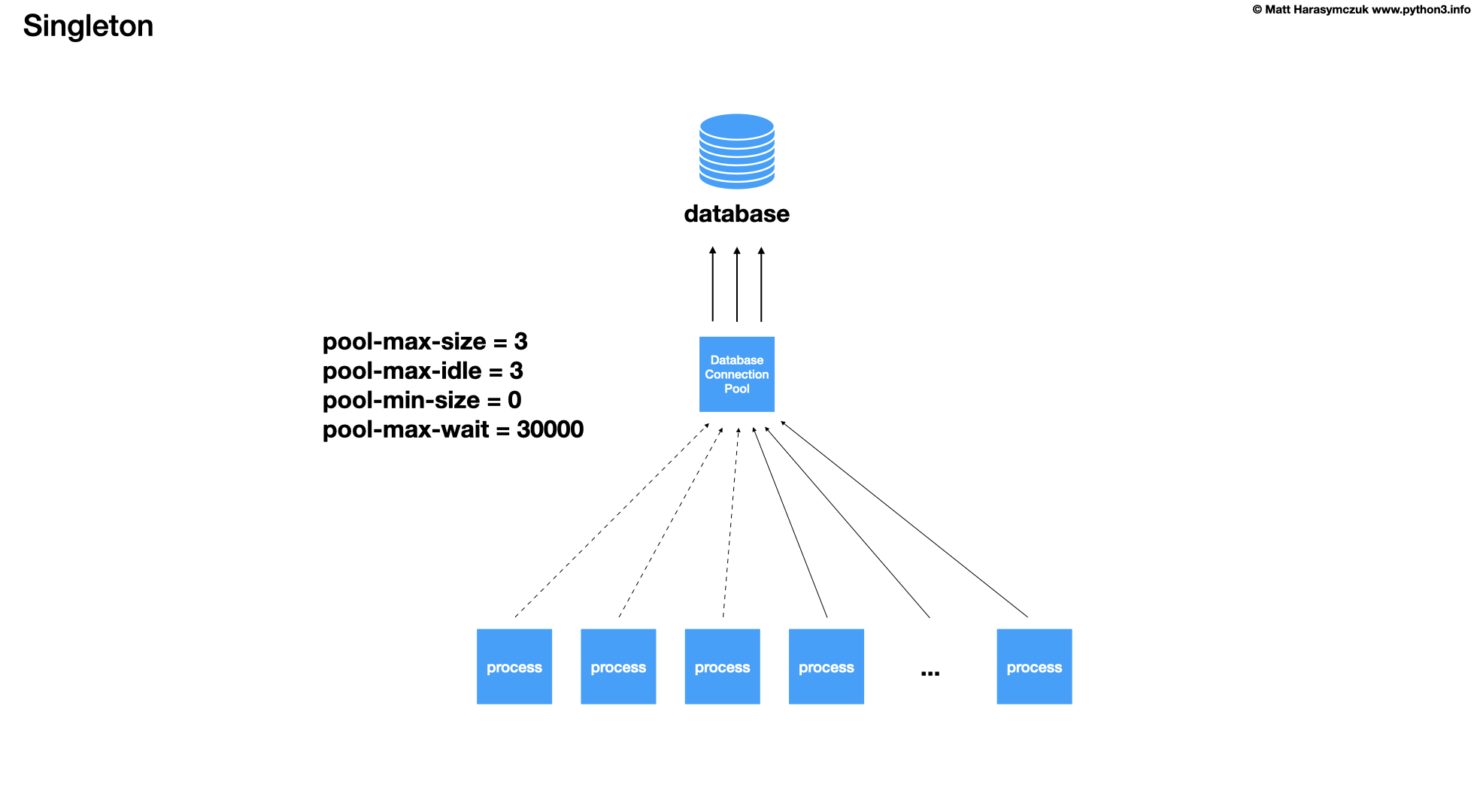
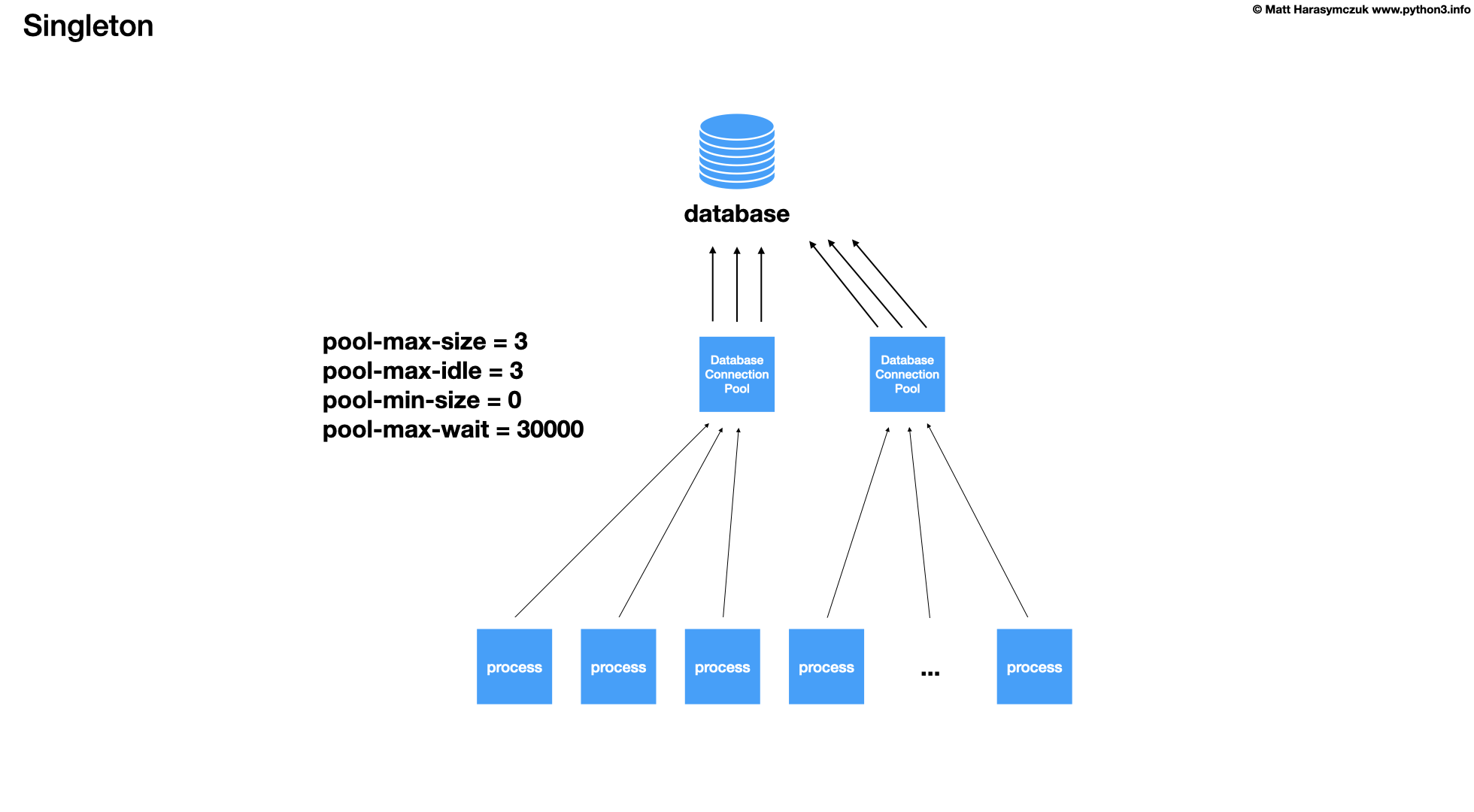
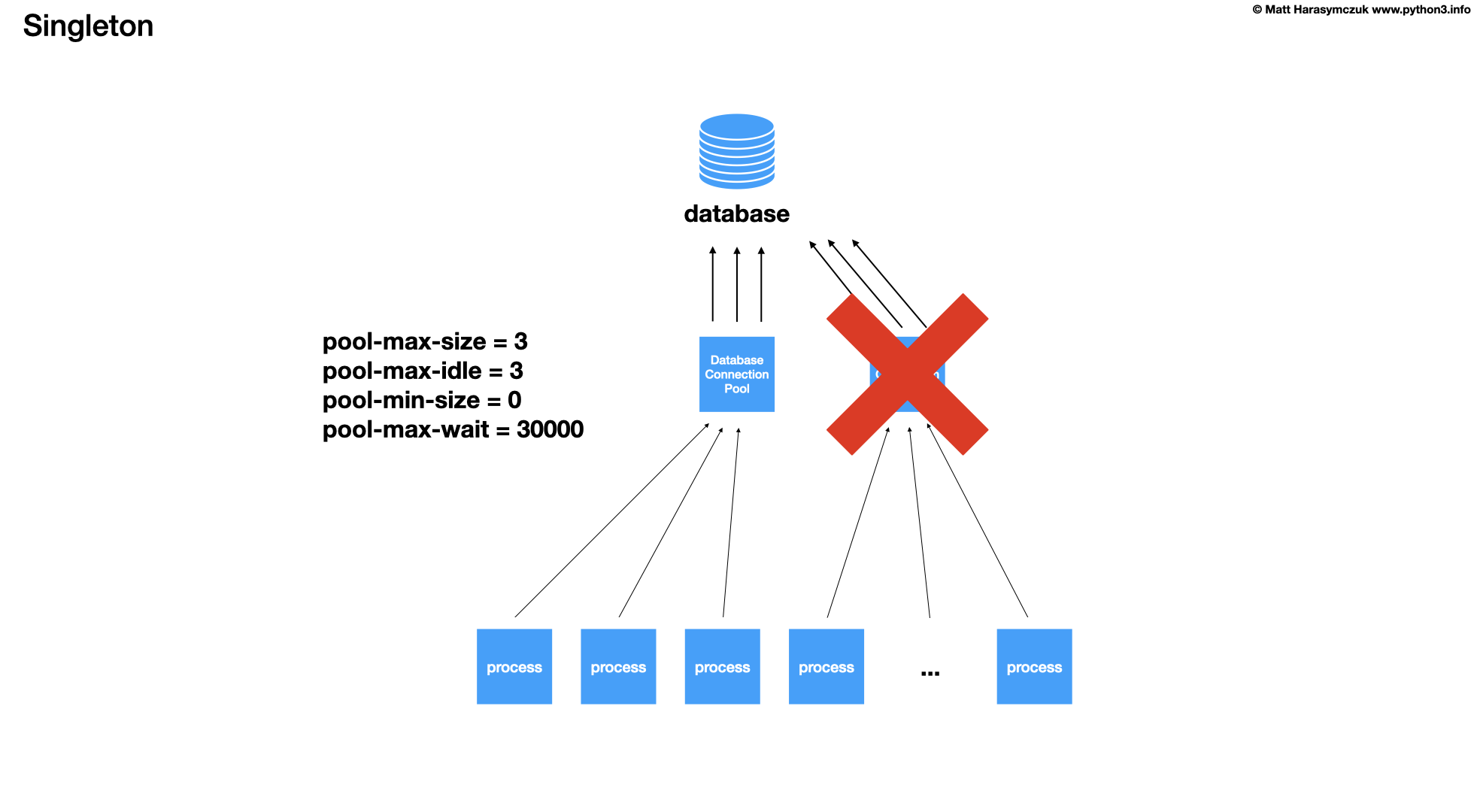
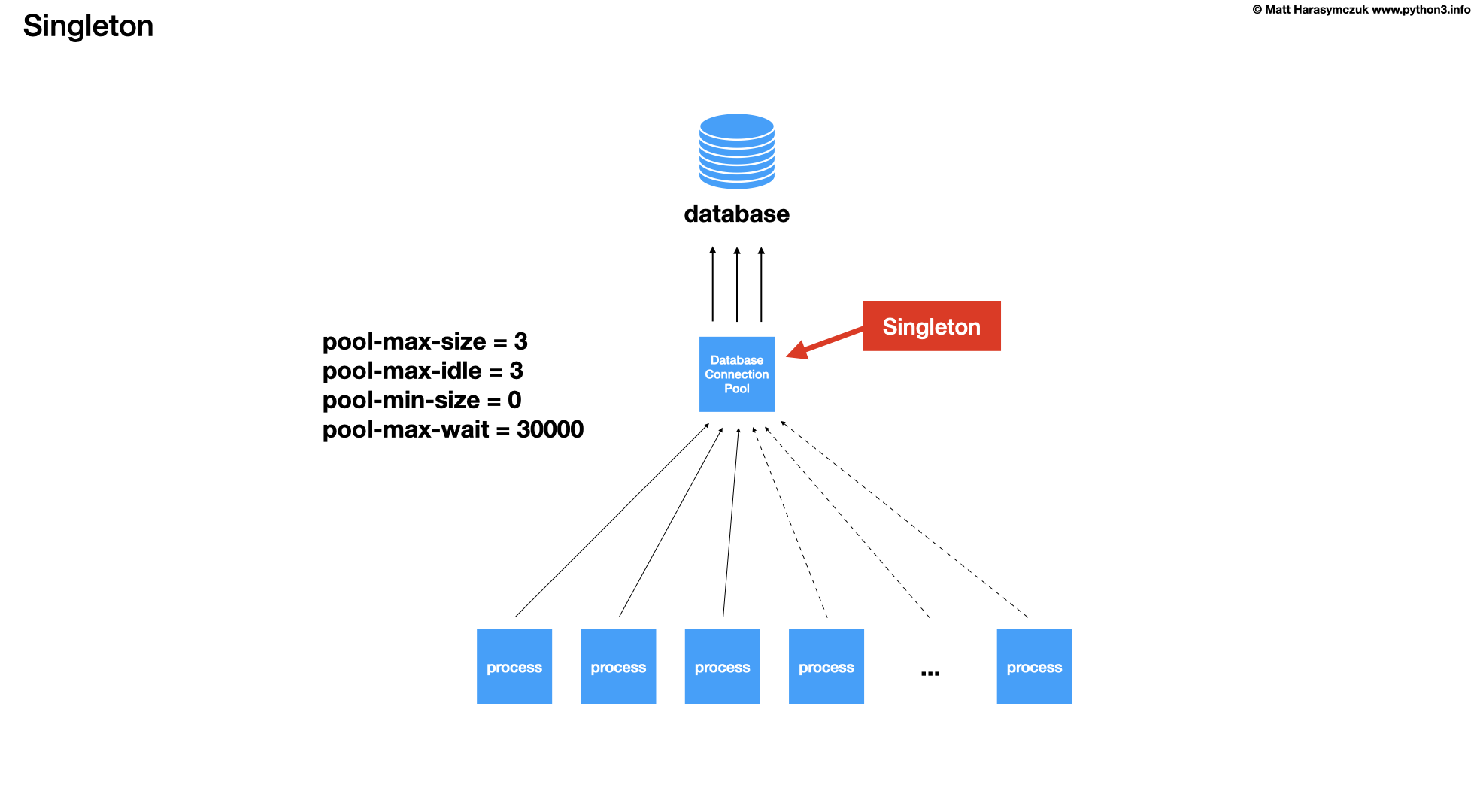
>>> class DatabaseConnectionPool(Singleton):
... pass
4.1.9. Use Case - 2
>>> from typing import Self
>>>
>>>
>>> class Database:
... connection: Self | None = None
...
... @classmethod
... def connect(cls):
... if not cls.connection:
... cls.connection = ... # connect to database
... return cls.connection
>>>
>>>
>>> db1 = Database.connect()
>>> db2 = Database.connect()
>>>
>>> db1 is db2
True
4.1.10. Use Case - 3
>>> from typing import Self
>>>
>>>
>>> class Singleton:
... instance: Self | None = None
...
... def __new__(cls, *args, **kwargs):
... if cls.instance is None:
... cls.instance = object.__new__(cls)
... cls.instance.__init__(*args, **kwargs)
... return cls.instance
>>>
>>>
>>> class Database(Singleton):
... pass
>>>
>>>
>>> db1 = Database()
>>> db2 = Database()
>>>
>>> db1 is db2
True
4.1.11. Use Case - 4
>>> class Singleton(type):
... instances = {}
...
... def __call__(cls, *args, **kwargs):
... if cls not in cls.instances:
... cls.instances[cls] = super().__call__(*args, **kwargs)
... return cls.instances[cls]
>>>
>>> class Base(metaclass=Singleton):
... pass
>>>
>>>
>>> class Database(Base):
... pass
>>>
>>> class Settings(Base):
... pass
>>>
>>>
>>> db1 = Database()
>>> db2 = Database()
>>>
>>> db1 is db2
True
4.1.12. Assignments
# %% About
# - Name: DesignPatterns Creational SingletonSettings
# - Difficulty: easy
# - Lines: 7
# - Minutes: 5
# %% License
# - Copyright 2025, Matt Harasymczuk <matt@python3.info>
# - This code can be used only for learning by humans
# - This code cannot be used for teaching others
# - This code cannot be used for teaching LLMs and AI algorithms
# - This code cannot be used in commercial or proprietary products
# - This code cannot be distributed in any form
# - This code cannot be changed in any form outside of training course
# - This code cannot have its license changed
# - If you use this code in your product, you must open-source it under GPLv2
# - Exception can be granted only by the author
# %% English
# 1. Create singleton class `Settings`
# 2. Use `get_instance()` classmethod
# 3. Run doctests - all must succeed
# %% Polish
# 1. Stwórz klasę singleton `Settings`
# 2. Użyj metody klasy `get_instance()`
# 3. Uruchom doctesty - wszystkie muszą się powieść
# %% Doctests
"""
>>> import sys; sys.tracebacklimit = 0
>>> assert sys.version_info >= (3, 9), \
'Python has an is invalid version; expected: `3.9` or newer.'
>>> from pprint import pprint
>>> result1 = Settings.get_instance()
>>> result2 = Settings.get_instance()
>>> assert type(result1) is Settings, \
'Variable `result1` has an invalid type; expected: `Settings`.'
>>> assert type(result2) is Settings, \
'Variable `result1` has an invalid type; expected: `Settings`.'
>>> result1 is result2
True
"""
# %% Run
# - PyCharm: right-click in the editor and `Run Doctest in ...`
# - PyCharm: keyboard shortcut `Control + Shift + F10`
# - Terminal: `python -m doctest -f -v myfile.py`
# %% Imports
# %% Types
from typing import Self
# %% Data
# %% Result
class Settings:
...
# %% About
# - Name: DesignPatterns Creational SingletonDatabaseConnection
# - Difficulty: easy
# - Lines: 7
# - Minutes: 5
# %% License
# - Copyright 2025, Matt Harasymczuk <matt@python3.info>
# - This code can be used only for learning by humans
# - This code cannot be used for teaching others
# - This code cannot be used for teaching LLMs and AI algorithms
# - This code cannot be used in commercial or proprietary products
# - This code cannot be distributed in any form
# - This code cannot be changed in any form outside of training course
# - This code cannot have its license changed
# - If you use this code in your product, you must open-source it under GPLv2
# - Exception can be granted only by the author
# %% English
# 1. Create singleton class `Database`
# 2. Use `connect()` classmethod
# 3. Run doctests - all must succeed
# %% Polish
# 1. Stwórz klasę singleton `Database`
# 2. Użyj metody klasy `connect()`
# 3. Uruchom doctesty - wszystkie muszą się powieść
# %% Doctests
"""
>>> import sys; sys.tracebacklimit = 0
>>> assert sys.version_info >= (3, 9), \
'Python has an is invalid version; expected: `3.9` or newer.'
>>> from pprint import pprint
>>> result1 = Database.connect()
>>> result2 = Database.connect()
>>> assert type(result1) is Database, \
'Variable `result1` has an invalid type; expected: `Database`.'
>>> assert type(result2) is Database, \
'Variable `result1` has an invalid type; expected: `Database`.'
>>> result1 is result2
True
"""
# %% Run
# - PyCharm: right-click in the editor and `Run Doctest in ...`
# - PyCharm: keyboard shortcut `Control + Shift + F10`
# - Terminal: `python -m doctest -f -v myfile.py`
# %% Imports
# %% Types
from typing import Self
# %% Data
# %% Result
class Database:
...
# %% About
# - Name: DesignPatterns Creational SingletonQueue
# - Difficulty: medium
# - Lines: 7
# - Minutes: 5
# %% License
# - Copyright 2025, Matt Harasymczuk <matt@python3.info>
# - This code can be used only for learning by humans
# - This code cannot be used for teaching others
# - This code cannot be used for teaching LLMs and AI algorithms
# - This code cannot be used in commercial or proprietary products
# - This code cannot be distributed in any form
# - This code cannot be changed in any form outside of training course
# - This code cannot have its license changed
# - If you use this code in your product, you must open-source it under GPLv2
# - Exception can be granted only by the author
# %% English
# 1. Create singleton class `Singleton`
# 2. Use `__new__()` object constructor
# 3. Run doctests - all must succeed
# %% Polish
# 1. Stwórz klasę singleton `Singleton`
# 2. Użyj konstruktora obiektu `__new__()`
# 3. Uruchom doctesty - wszystkie muszą się powieść
# %% Doctests
"""
>>> import sys; sys.tracebacklimit = 0
>>> assert sys.version_info >= (3, 9), \
'Python has an is invalid version; expected: `3.9` or newer.'
>>> from pprint import pprint
>>> class Queue(Singleton):
... pass
>>> result1 = Queue()
>>> result2 = Queue()
>>> assert type(result1) is Queue, \
'Variable `result1` has an invalid type; expected: `Queue`.'
>>> assert type(result2) is Queue, \
'Variable `result1` has an invalid type; expected: `Queue`.'
>>> result1 is result2
True
"""
# %% Run
# - PyCharm: right-click in the editor and `Run Doctest in ...`
# - PyCharm: keyboard shortcut `Control + Shift + F10`
# - Terminal: `python -m doctest -f -v myfile.py`
# %% Imports
# %% Types
from typing import Self
# %% Data
# %% Result
class Singleton:
...
# %% About
# - Name: DesignPatterns Creational SingletonLogger
# - Difficulty: medium
# - Lines: 7
# - Minutes: 5
# %% License
# - Copyright 2025, Matt Harasymczuk <matt@python3.info>
# - This code can be used only for learning by humans
# - This code cannot be used for teaching others
# - This code cannot be used for teaching LLMs and AI algorithms
# - This code cannot be used in commercial or proprietary products
# - This code cannot be distributed in any form
# - This code cannot be changed in any form outside of training course
# - This code cannot have its license changed
# - If you use this code in your product, you must open-source it under GPLv2
# - Exception can be granted only by the author
# %% English
# 1. Create singleton class `Singleton`
# 2. Use `Metaclass`
# 3. Run doctests - all must succeed
# %% Polish
# 1. Stwórz klasę singleton `Singleton`
# 2. Użyj `Metaclass`
# 3. Uruchom doctesty - wszystkie muszą się powieść
# %% Doctests
"""
>>> import sys; sys.tracebacklimit = 0
>>> assert sys.version_info >= (3, 9), \
'Python has an is invalid version; expected: `3.9` or newer.'
>>> from pprint import pprint
>>> class Logger(metaclass=Singleton):
... pass
>>> result1 = Logger()
>>> result2 = Logger()
>>> assert type(result1) is Logger, \
'Variable `result1` has an invalid type; expected: `Logger`.'
>>> assert type(result2) is Logger, \
'Variable `result1` has an invalid type; expected: `Logger`.'
>>> result1 is result2
True
"""
# %% Run
# - PyCharm: right-click in the editor and `Run Doctest in ...`
# - PyCharm: keyboard shortcut `Control + Shift + F10`
# - Terminal: `python -m doctest -f -v myfile.py`
# %% Imports
# %% Types
# %% Data
# %% Result
class Singleton(type):
...